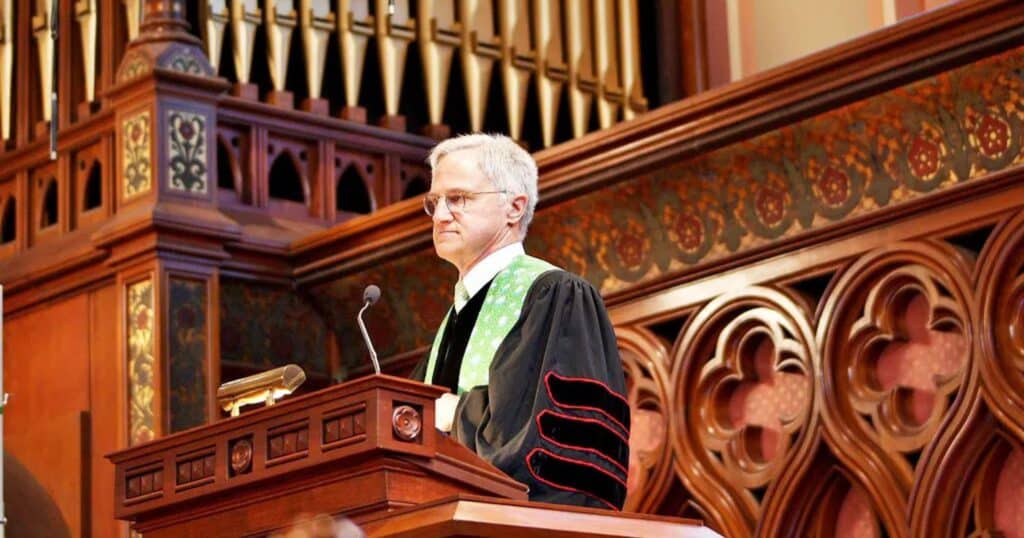Commentary: Preaching an ‘election sermon’ is urgently needed
In this commentary, the Rev. Jim Antal — a longtime United Church of Christ environmental justice advocate and former Conference Minister — urges and offers advice for pastors to preach about the climate crisis, democracy and civic engagement as the United States prepares for the 2024 election season.
When it comes to addressing the crisis of democracy as well as the climate emergency, what we need to do is reach the human heart.
That’s exactly what congregations, clergy and people of faith are good at doing. Engaging public life is as important as any purpose of the church, the synagogue or the mosque.
God-faring (yes, God-faring, not God-fearing) people of faith can no longer stand idly by as the stability of our democracy, the authority of our Constitution and the rule of law come under attack.
We can no longer be bystanders as Christian Nationalists prepare to transition our government from a democracy to a theocracy. Similarly, God-faring people of faith can no longer be silent as the climate crisis unjustly destroys the lives of the most vulnerable on Earth — those who did the least to cause it — those we are called to love and care for. We can no longer ignore the disinformation and lies perpetrated by corporate profiteers who focus only on maximizing quarterly profits as they wreck the Earth for all future generations.
In 2024, public life in the United States will be dominated by the run-up to the election. A little-known fact of American history is that for 250 years (1634-1884), one of the ways congregations engaged public life was to hear an election sermon. As an election approached, houses of worship would fill with citizens eager to reflect on the moral qualifications of those running for office.
Today, though, it is likely that little to nothing will be said about the election in many of our houses of worship.
Moral principles for political decision-making
It’s time to reawaken this moral witness. Doing so will require people of faith, houses of worship and their clergy to overcome their longstanding aversion, and their congregation’s resistance, to mixing politics and religion.
I did my best to address this challenge when, from 2006-2018, I served as leader of more than 350 United Church of Christ churches in Massachusetts. In the months prior to most elections, I offered a workshop for clergy that focused on the history and importance of preaching an election sermon and the general concern about politics and the church.
During my 20 years serving as a local pastor in two congregations, I preached many election sermons. While they were obviously political, they were never partisan. I never endorsed a candidate, and rarely mentioned them. Instead, I did my best to provide my congregation with what I discerned to be timeless moral principles that should guide our political decision-making — principles that are not only rooted in our faith tradition but are also supported by every faith tradition I know of.
- Which candidate’s past record and current promises demonstrate how society and government must care for the least of these among us?
- Which candidate is most likely to preserve and advance justice while promoting the common good?
- Which candidate’s proposed policies and past practices take into consideration the integrity of creation — the care for our common home — for all of humanity and for future generations?
- Which candidate’s advertising, endorsements and other means of campaigning reveal someone who tells and adheres to the truth?
These moral principles are no less relevant today than when I preached them decades ago. Clergy from any faith tradition could make these principles the core of their election sermon and support each principle with scripture from their tradition.
Taking a risk
In addition to providing these timeless moral principles, I would emphasize our sacred responsibility to vote. Voting is the means by which we elect leaders and advance laws that can and should underwrite the principles I have listed.
As the ideological divide in our country — and in many of our congregations — becomes more and more apparent, clergy are often reluctant to speak about the importance of voting or to lift up the principles that should inform people of faith as they consider their choices on Election Day. Many clergy worry that if they enter this discussion, they will be disregarded and accused of being political.
While that may be a risk, the upcoming election presents every congregation and every clergy leader with an opportunity to identify the values and principles that guide us, as people of faith, when we consider our “life together” as residents of our state or country.
Houses of worship and people of faith need to examine how our community, our state and our nation address the needs of the least of these among us; how we assure and advance justice; how we promote the common good; how we tell and adhere to the truth; and how we preserve and restore God’s creation.
These are core values of the church, the synagogue and the mosque — and politics are the means by which all of these values are upheld.
Read Rev. Antal’s full article here.
Content on ucc.org is copyrighted by the National Setting of the United Church of Christ and may be only shared according to the guidelines outlined here.
Related News
A Moment of Silence
The weekend news was alarming. Two students shot and killed with 9 injured at Brown University...
Read MoreIn hope-filled worship service, UCC and United Church of Canada celebrate full communion past and future
On Saturday, Dec. 13, many from the United Church of Christ (UCC) and the United Church of...
Read More‘A Gift of God to the World:’ Christmas greetings from the General Minister and President
As Christmas quickly approaches, UCC General Minister and President/CEO the Rev. Karen Georgia...
Read More


